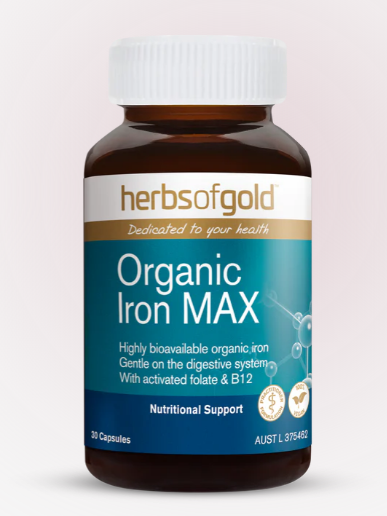
Running low on energy? You may need to consider your dietary intake of iron!
Head copy: Alarmingly each year 1.5 million Australians see their doctor about low energy. Energy is essential in shaping our overall vitality, and without it we run the risk of feeling flat in all areas of our lives. One of the keys to unlocking optimal energy is maintaining adequate levels of iron. Why is iron important for energy and how can you boost your intake? Read on to find out more!
What is iron?
Iron is an essential micromineral involved in supporting blood health, immune health, nervous system health and energy production. Great sources of dietary iron include red meat, liver, chickpeas, lentils, tofu and spinach.
While iron can be sourced from plants, it’s important to note that it’s not as well-absorbed as animal derived iron. Not to worry plant-eaters! There are ways to ensure you are getting the most iron out of your food no matter your dietary preference. Read until the end for some useful tips on how to maximize your iron intake.
How does iron support energy production in the body?
It does this by supporting the production of special oxygen-carrying cells in the body – red blood cells. The body requires oxygen to transform food into energy to power all necessary functions, such as eating, breathing, sleeping and moving. Without adequate iron, the flow of oxygen around the body is limited, and over time this can manifest as symptoms such as fatigue, brain fog, breathlessness and pale skin.
How much do I need?
The recommended dietary intake (RDI) of iron for men aged 19 years and above is 8mg. However, the RDI of iron for women aged 19-51 years is 18mg and 8mg for 51 years and above. If you are pregnant, the RDI of iron rises by about 33% to 27mg. Why is there such a vast discrepancy in iron needs between men and women? Women of child-bearing age and who are pregnant need more iron to counteract blood losses due to menstruation and to cater for increased nutritional needs to support the growing baby, respectively.
Because of the difficulty of obtaining iron from plant-based sources, some experts have recommended that vegans and vegetarians consume 80% more than the current RDI of iron for men and women to offset this dietary barrier.
Optimize your iron intake for optimal energy by:
-
Munching on iron-rich foods daily – some food ideas include, popping in baby spinach in your breakfast smoothie or serving lean beef mince rissoles with a vibrant salad for dinner
-
Consuming vitamin C with iron-dense foods – especially in combination with plant sources of iron. Great food sources of vitamin C include capsicums, tomatoes, oranges and pawpaw
-
Considering a good quality Iron Supplement – which may be beneficial for those who have a higher risk of iron deficiency due to poor dietary intake. Ensure best health outcomes by selecting an iron supplement that features an organic form of iron such as ferrous bisglycinate, which is highly absorbable and gentle on the stomach
-
Avoiding taking an iron supplement alongside other mineral supplements (e.g. calcium and zinc) and coffee and green/black tea as these blocks’ effective uptake of iron in the gut . To minimize this risk, try drinking your coffee or ingesting other nutritional minerals one to two hours away from iron supplementation


